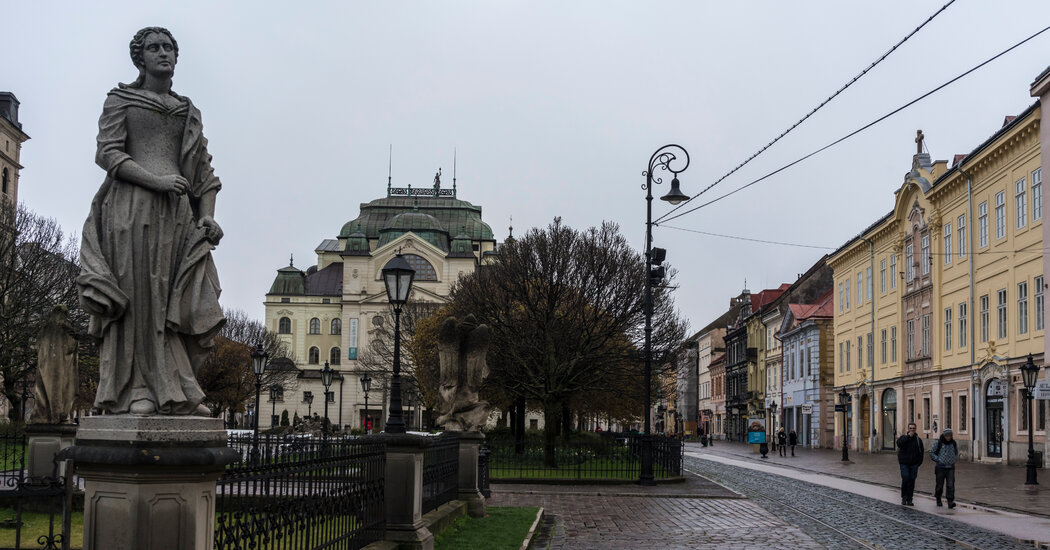
KOSICE, Slovakia — He lived with his sick mother and never had a regular job. He had no obvious source of income and, according to his uncle, even signed up for welfare benefits as a caregiver deserving of state support.
But Bohus Garbar, down-on-his-luck and in his early 50s, still managed to donate thousands of euros to Kremlin-friendly, far-right political parties in Slovakia. He also worked for free as a contributor to an anti-establishment website notorious for recycling Russian propaganda.
Family and friends are mystified.
“He definitely wasn’t in a state where he could support any political party,” said Mr. Garbar’s uncle, Bohuslav Garbar, a retired computer programmer in the family’s hometown of Kosice, 50 miles from Slovakia’s eastern border with Ukraine.
A Slovak security service surveillance video, made public in early March, provides at least the start of an explanation: it shows his nephew receiving instructions and two 500-euro bills, a small part of what officials say were tens of thousands of euros in payments, from a Russian military intelligence officer masquerading as a diplomat at Moscow’s embassy in Bratislava, the Slovak capital.
“I told Moscow that you are such a good boy,” the Russian spy, Sergei Solomasov, can be heard telling his Slovak recruit before explaining that Moscow would like Mr. Garbar to act as a “hunter” on the prowl for people of influence willing to cooperate with Russia.
For years, European intelligence agencies have sounded the alarm over the clandestine activities of Russian spies, while regarding with suspicion those who cheerlead for Russia and its president, Vladimir V. Putin. Moscow routinely dismissed this as paranoid “Russophobia,” its catchall response to nearly all foreign criticism.
The invasion of Ukraine, accompanied by a barrage of transparent lies, however, has vindicated the darkest Western suspicions and accelerated efforts to uproot hidden networks of spies and their recruits.
Slovakia, a small Slavic nation with a strongly pro-Western government but also large reserves of genuine, homegrown sympathy for Russia, shows in microcosm how the Kremlin has sought to win influence and sow discord on Europe’s formerly communist eastern fringe by leveraging spies, paid helpers, far-right nationalists and disinformation-spouting media.
“We always suspected this was happening, but now we have a smoking gun,” said Daniel Milo, director of an Interior Ministry unit responsible for monitoring and countering disinformation. “This is a clear example of how the Russians operate.”
Mr. Garbar, he added, “is just the tip of the iceberg. We don’t know yet how many other Garbars are out there running around.”
The video of Mr. Garbar’s rendezvous with Mr. Solomasov, the Russian spy, was recorded last year by Slovakia’s military intelligence agency as part of a long investigation. Mr. Solomasov was expelled early last month, among more than 30 Russian diplomats recently sent home from Bratislava, as well as scores more from other European capitals.
Mr. Garbar, arrested and charged with espionage and bribe-taking, has been released from detention pending his trial. The former vice-rector of Slovakia’s military academy was also charged with betraying his country to Russia for money.
Officials say both have confessed and are now cooperating with investigators.
“They are talking and talking and talking and this has to make the Russian network in Slovakia very nervous,” Jaroslav Nad, the defense minister, said in an interview.
Russia has not commented on Mr. Garbar’s liaison with Russian military intelligence, but it called the expulsion of Mr. Solomasov “groundless.”
Russia’s push for influence, officials say, kicked into high gear after its 2014 annexation of Crimea and initial invasion of eastern Ukraine, generating a flood of Russian disinformation in Slovakia and across the region. Friendly outlets routinely portray Russia as a champion of peace and lodestar of Christian values, while casting NATO as a warmongering menace.
Helping this push in Slovakia and neighboring countries was Alexander Usovsky, a freelance Russian nationalist agitator who received funding from Konstantin Malofeev, a wealthy private businessman in Moscow whom the U.S. Treasury on Wednesday named as the leader of a “malign influence network” working to undermine sanctions.
Mr. Usovsky set up the East European Cultural Initiative in Bratislava and various websites across East and Central Europe to rally support for Russia and its seizure of Crimea. His privately funded ventures, unlike Mr. Garbar’s operations, gave the Russian state plausible deniability but fizzled when money from Mr. Malofeev ran out.
In a survey released last year by Globesec, a Bratislava research group, more than half of those surveyed in Slovakia said they viewed Mr. Putin positively, compared with just 12 percent in neighboring Poland and 13 percent in Lithuania.
If an unlikely enabler, Mr. Garber proved a valuable conduit who donated large sums of money to nationalist parties enamored with Moscow. One beneficiary was the ultranationalist politician Marian Kotleba, who was given a six-month suspended jail sentence this month and stripped of his seat in Parliament for using Nazi-themed symbols.
After winning election as a regional governor in 2013, Mr. Kotleba put up a banner outside his office: “Yankees go home! STOP NATO!”
Official records show that Mr. Garbar donated 10,000 euros to Mr. Kotleba’s xenophobic party ahead of parliamentary elections in 2016, making him its second biggest donor. Mr. Kotleba’s campaign slogans for that election included “For Slavic brotherhood, against a war with Russia!” In 2018, Mr. Garbar donated a further 4,500 euros to one of Mr. Kotleba’s pro-Russian partner parties.
Investigators have also examined Mr. Garbar’s work as an unpaid contributor and translator for Hlavne Spravy, or Main News. Slovak authorities shut down the website, which calls itself a “conservative daily,” in early March for unspecified “harmful activity,” shortly after the start of Russia’s invasion of Ukraine.
It still operates, in a reduced form, on Facebook, which Victor Breiner, an adviser to the Slovak defense minister, described as “the main arena now for Kremlin propaganda.”
In the weeks before Russia’s Feb. 24 invasion of Ukraine, Main News often echoed Kremlin talking points, mocking American warnings of a coming attack on Ukraine as “hysteria without end” and instead blaming NATO for rising tensions.
Russia-Ukraine War: Key Developments
Robert Supko, the founder and editor of Main News, which he runs from his apartment in Kosice, scorned the security service video — first published by a rival and liberal-leaning media outlet, Dennik N — as a “spy parody” and said he knew nothing of his unpaid helper’s paid work for Russian military intelligence. “We were all very surprised by it, everybody who knows him,” he said in an interview.
Mr. Supko said he set up Main News after attending an anti-abortion protest in 2012 that mainstream media outlets all ignored. Without alternative news sources, he decided, “our opinions, the Christian-conservative view, will be pushed out from the public space completely.” Russia, he added, “is more normal” than the liberal West.
He denied taking money himself from Russia other than what he said were payments of around 600 euros to cover the cost of ads that the Russian embassy had placed on his site.
Mr. Supko contended that Main News was not overly pro-Russian, though he conceded that “maybe we rooted a little bit more for Russia” to counter what he called “American propaganda” published elsewhere. He also acknowledged that his staff had for four years included Yevgeny Palcev, a Russian resident of Slovakia with ties to state media in Moscow, who wrote fiercely pro-Kremlin articles for the website under a pseudonym.
They parted ways in 2018. “We liked Russia, but not like that. Not that much,” Mr. Supko recalled.
He said he had known Mr. Garbar for thirty years and insisted that his old friend only wrote occasional articles about China. Officials say otherwise. “He was very much involved in writing about lots of things other than China” and spreading “classic Russia propaganda narratives,” said Mr. Nad, Slovakia’s defense minister.
Miroslava Sawiris, an expert on disinformation and adviser to the Slovak government’s Security Council, said the Main News website was “quite sophisticated and did not just spew nonsense.” She said “openly pro-Kremlin” stories accounted for only around 20 percent of the content but achieved unusual reach and influence because of the site’s popularity.
In recent years, as the far right surged in Europe, Main News became what Matej Kendrik, the director of the Strategic Policy Institute, a Slovak research group, described as “the hegemon” in the “media family of alternative news and conspiracy theories.”
It was particularly influential, for example, in stoking fierce opposition early this year to a proposed defense pact between Slovakia and the United States. The pact, which was finally approved by the Slovak Parliament shortly before Russia’s invasion of Ukraine, “activated all the pro-Russian players” in a “massive anti-America reaction,” said Michal Trnka, the chief executive of Gerulata Techologies, a Bratislava company focused on data analysis.
Like many other Russia-friendly media outlets, Main News was thrown off balance by Mr. Putin’s onslaught against Ukraine and struggled for several days to explain it. Mr. Supko said he and his staff had decided that Russia should be criticized just as “we criticized America’s imperialist wars,” but by then their site was shut down.
In the video of his meeting with the Russian spy, Mr. Garbar explains that finding useful people to work for Moscow could be difficult because those who support Russia tend to be marginal types with no real influence or access to information.
“There are many people who are pro-Russian but they are irrelevant,” Mr. Garbar warned Mr. Solomasov, adding, “They’d give you nothing.”
Mr. Garbar’s uncle said he was mystified that his nephew, who was always fascinated by American culture, particularly heavy metal bands like Metallica, would ever get entangled with Russia. “This whole Russian thing is very strange. He must have gotten into some sort of environment where something happened,” he said.
Ms. Sawiris, the government expert on disinformation, said she did not know what had happened to Mr. Garbar, but worries that “there is no limit to the impact propaganda can have on the human mind, as we now see in Russia.” Since Russia invaded Ukraine, she added, “the curtain has fallen and lots of things have become obvious.”
Miroslava German Sirotnikova contributed reporting from Bratislava.




